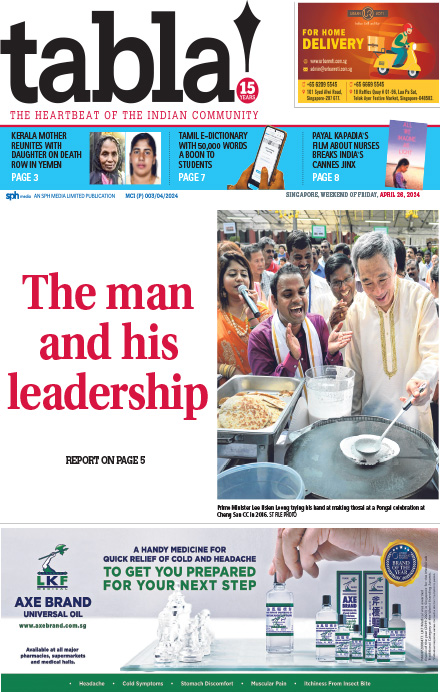A scene from the film tells it all in stark fashion.
A little girl in pink pyjamas and cheery, striped socks is snuggling on a couch with her father, a well-known TV news anchor, in their New Delhi apartment.
Little Tipu wants to show her father, Ravish Kumar, a music video on his phone. But soon the song is interrupted by an incoming phone call.
Kumar swipes the red "Decline" button and the song resumes. Only to be interrupted again. The caller is persistent.
The impish smile on little Tipu's face is now completely wiped out. A mix of sadness, fear and resignation sets in as she rests her head on her father's shoulder.
Kumar, an award-winning journalist and the popular face at NDTV, has been receiving death threats from callers for years. When his phone rings, his wife and daughter stop what they are doing and pay close attention before deciding whether to monitor or ignore the call.
The scene in the Kumar household unfolds in the documentary While We Watched, which won the Amplify Voices Award at the Toronto International Film Festival recently.
It reportedly received a standing ovation at the screening.
"While We Watched is a compelling, urgent film that collapses our differences. It is a wake-up call to how perilous and fragile the relationship between a free press and democracy is everywhere," said the jury statement.
It is the second Indian documentary on journalism in recent months that has caught the world's attention.
Last year, Writing With Fire became the country's first nominee in the Best Documentary Feature category at the Oscars. The film by Rintu Thomas and Sushmit Ghosh was about journalists Meera Devi, Suneeta Prajapati and Shyamkali Devi of Khabar Lahariya, the only rural Indian newspaper led by women.
While We Watched captures 48-year-old Kumar as a lone soldier in decline amid dwindling Television Rating Points (TRPs), budget cuts and layoffs, and "lack of intellectual capital in the newsrooms", as he puts it in the film. TRP is a tool to find out which channels or TV programmes are watched the most.
The documentary also shows the larger world of news where the journalistic spirit of questioning and inquiry is being forced out by misinformation, propaganda, bigotry and hate politics - all in the garb of nationalism by sundry TV news anchors.
Journalists like Kumar, on the other hand, are dubbed traitors, anti-national and enemies of the state. They are abused and threatened, striking fear in the hearts of their friends and family. Despite that, they continue with news breaks and sting operations that attract blocked signals and frozen broadcasts.
The film shows the curtailment of dissent and the media deliberately moving away from issues that matter to ceaseless, pointless noise-making.
Kumar is shown in the film to be telling people to stay as far away from TV news as possible, even as he keeps wondering about his own relevance.
The documentary also comes at a time when NDTV, one of the rare Indian TV news outfits that at times do not toe the official line, faces the threat of a hostile takeover by billionaire Gautam Adani, who is known to be close to Indian Prime Minister Narendra Modi.
Director Vinay Shukla, 39, calls While We Watched the story of loneliness felt by people who fight against the mainstream. It is about the despair, despondency and resilience in being alone against the world.
"Whenever you're going against the current, you wonder on certain nights if you should be doing this any more. This film will hold the hand of the people who feel the isolation and loneliness as a rebel," he told Al Jazeera.
Describing the film as his love letter to journalism, Mr Shukla said: "Journalists are the foremost storytellers of our time. I spent two years in Ravish's newsroom, watching him build his daily broadcast.
"Ravish and his team would get some stories right, some stories just about. Watching him, I realised that for every report that we see on the news, the journalist behind the report pays a cost - an emotional, financial, ethical and mental cost. No story is easy, every story is personal. This film is about that personal cost that journalists pay to do their job right."
Mr Shukla said his film would apply to journalists who stood their ground and chose to file a story that was true to their beliefs.
His previous film, An Insignificant Man, which he wrote, directed and shot along with Khushboo Ranka, chronicled the rise of the Aam Aadmi Party and civil servant-turned-activist and politician Arvind Kejriwal, who is currently the chief minister of Delhi.
It was a rare documentary that found a theatrical release in India, ran for several weeks and became a sleeper hit of the year.
"My previous film was a love letter to idealism. While We Watched is an angry letter to journalism," said Shukla.
While We Watched is significant because the crisis afflicting journalism in India holds true for the world at large, the reason why it resonated with the eclectic audience in Toronto.
Indo-Asian News Service



